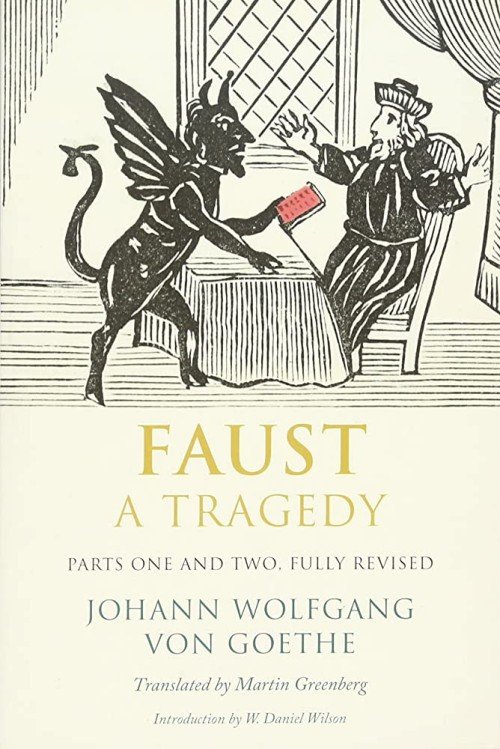
Faust is a novel written by Johann Wolfgang von Goethe, one of the most famous and influential works of German literature. Published in two parts, Faust tells the story of a man who makes a deal with the devil in exchange for knowledge and pleasure. The story explores themes of ambition, morality, and the human condition.
The protagonist of the novel is Faust, a successful but dissatisfied scholar who feels that his life lacks meaning and purpose. In his quest for knowledge, he turns to the devil, who appears in the form of Mephistopheles. Together, they embark on a journey of discovery that takes them through various stages of human experience.
Faust, written by Johann Wolfgang von Goethe, is a masterpiece of literature that has captivated readers for over two centuries. The novel tells the story of Faust, a successful but dissatisfied scholar who makes a deal with the devil, Mephistopheles, in exchange for knowledge and pleasure. Throughout the story, Faust struggles with his conscience and engages in various pursuits that ultimately lead to his downfall.
One of the most striking aspects of Faust is the depth of Goethe's characterization. Faust is a complex and multifaceted character, driven by both ambition and a sense of disillusionment with his life. Mephistopheles is similarly complex, portrayed not as a terrifying figure, but as a charming and seductive tempter who leads Faust astray.
Goethe's writing is both poetic and evocative, bringing to life the world and characters of Faust in vivid detail. The novel is filled with powerful imagery and metaphors, which serve to deepen the themes and ideas that Goethe explores throughout the story.
At its core, Faust is a deeply philosophical work, exploring themes of morality, ambition, and the human condition. Goethe uses the character of Faust as a vehicle for his own musings on the nature of existence, and the novel is filled with profound insights into the human psyche.
Overall, Faust is a must-read for anyone interested in classic literature or exploring the depths of the human experience. Goethe's writing is both beautiful and thought-provoking, and the story he tells is one that will stay with readers long after they have finished the book.
Throughout the novel, Faust struggles with his conscience as he pursues his desires. He engages in various activities, such as seducing a young woman named Gretchen and attempting to achieve greatness through political power, but ultimately finds that these pursuits only lead to his downfall.
Despite its dark subject matter, Faust is also a work of great beauty and depth. Goethe's writing is poetic and evocative, painting vivid pictures of the world and the characters that inhabit it. His exploration of the human psyche and the human condition is both profound and insightful.
One of the most fascinating aspects of Faust is the character of Mephistopheles. The devil is portrayed not as a menacing figure, but as a cunning and charismatic trickster who tempts Faust with promises of knowledge and pleasure. This portrayal of the devil has had a significant influence on popular culture, inspiring countless works of literature, art, and music.
The main idea of Faust, written by Johann Wolfgang von Goethe, is a profound exploration of the human condition and the struggle for meaning and purpose in life. The novel tells the story of Faust, a scholar who feels dissatisfied with his life and makes a pact with the devil, Mephistopheles, in order to achieve his desires.
Throughout the novel, Faust engages in various pursuits, such as the pursuit of knowledge, pleasure, and power, but ultimately finds that these pursuits only lead to his downfall. He struggles with his conscience as he realizes the consequences of his actions and the toll they take on himself and others.
Goethe's writing is filled with complex themes and ideas, such as the struggle between good and evil, the search for enlightenment and redemption, and the limitations of human knowledge and ambition. The novel is a deeply philosophical work that explores the human psyche and the human condition in profound and thought-provoking ways.
At its core, the main idea of Faust is a warning against the dangers of unchecked ambition and the pursuit of pleasure at the expense of one's morality and conscience. It is a cautionary tale that encourages readers to reflect on their own lives and the choices they make in pursuit of their desires.
In conclusion, Faust is a masterpiece of literature that has stood the test of time. Its exploration of human nature and the human condition is as relevant today as it was when it was first published over 200 years ago. Whether you are a fan of classic literature or simply interested in exploring the depths of the human psyche, Faust is a must-read.








